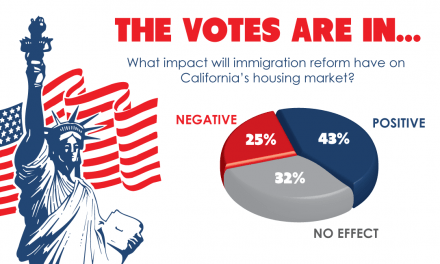When will the bidding wars end?
- Within six months (32%, 24 Votes)
- Between six months and a year (30%, 22 Votes)
- Over a year (28%, 21 Votes)
- They've already ended (9%, 7 Votes)
Total Voters: 74
Prevailing wisdom holds we are in the midst of a seller’s market. The market appears to be short on inventory and long on buyers.
There is a high volume of offers competing to buy from a static supply of newly listed homes. Thus, determined buyers fly into each other and set off bidding wars. In the process, the price of a property is inevitably pushed higher and higher by competing offers.
The distortions created by excess buyers allow sellers to freely set sales terms without much risk of pricing themselves out of the market. Willing participants are waiting to pounce and sellers are opting for offers without mortgage contingencies.
Buyers that require a mortgage contingency provision in their offer present a risk to the seller. Mortgage contingencies give buyers the option of backing out if they are unable to obtain mortgage financing. Or worse, if property value isn’t there, the buyer may abort the potential of a pricy sale and leave the seller as owner of the property. Consequently, many sellers are accepting cash offers from buyers with the fewest or no contingencies.
As a result, buyers who need financing – the vast majority of buyer-occupants – are elbowed out of the market by those who pay cash or at least 50% down. They outmatch the negotiating power of the typical buyer-occupant for a home. Thus, in bidding wars, the cash buyer tends to win out even though they may not offer the highest price.
So what is causing this seller pricing power? Conventional wisdom dictates a lack-of-supply is the culprit bringing on high price inflation. Thus, as espoused, an increase in inventory prevents offers from exploding into a bidding war.
first tuesday insight
Other parts of the country aside, in California we have the sneaking suspicion there is another potent factor at work other than the short-inventory supply theory.
On the surface, housing inventory clearly seems insufficient to accommodate current buyer demand. Today’s flock of buyers instantly descends on a property the second it hits the market. In the process, no time is spent investigating and selecting whether this is the right home and location for a family. Offers are placed in a desperate, knee-jerk reaction.
But there’s more to this story.
Consider this: a fast growing shadow inventory lurks just below the surface of this frenzied pack of buyers. A sizable portion of the housing market – 1/3rd of sales for over 12 months – has been temporarily removed by speculators. These speculators are intent on acquiring hard assets in lieu of holding cash.
These hit-and-run buyers are fully convinced the Federal Reserve’s (the Fed’s) monetary policy of pumping money into the economy at zero lower-bound interest rates will drive real estate prices up just like the presently soaring stock market. Since consumer buying power has not increased (not without jobs), why would real estate price inflation exist? In fact, “historically low” nominal interest rates on mortgages are actually high in relation to all other current rates of interest.
At some point before interest rates rise to shrink the money supply and buyers’ borrowing capacity, speculators intend to return the homes to the market in the hope of turning a tidy profit. For the moment, this speculator frenzy has left cash-poor and mortgage-dependent homebuyers out in the cold.
Related reading
However, the newfound pricing freedom enjoyed by sellers today has its limits. At some point, either:
- inventory will take on more listings as price increases draw in sellers or (as is more likely);
- buyers will fade away in reverse order in response to each rise in prices and mortgage rates.
Bidding wars place the agent in an awkward position. Agents are predisposed to put a deal together and earn a fee. Yet, isn’t it the duty of the buyer’s agent to get the best price possible for their client?
Thus, the agent has an inherent incentive to enter into a bidding war with the client’s money to make a deal, even if it goes against the best advice to be given and the best interest of the buyer. This, of course, is the antithesis of the buyer’s agent’s fiduciary duty owed to their client.
Related reading
Speculators depend on an eventual end-user to buy property they hold title to in order to realize the expected gain. As speculators complete the cycle of their buy-and-flip routine, the supply of homes in the MLS inventory will dramatically outpace end-user demand in the market. After starving themselves out of a profit, the speculators will flock elsewhere and eventually die off. Where will they likely scurry to? The stock market to cash in on an economy that is delivering ever greater corporate profits.
Agent advice
Unless your buyer can pay cash up front, the current market is one of two things:
- a waiting game; or
- a bidding war.
If your buyer-occupant client is able to pay cash for a home (and the willingness to pay today’s mini-bubble prices), now may be the time to buy for the long haul. Otherwise, a good agent will advise on alternative options: often, to just wait out the speculators, then buy from them as they flee the scene they created.
RE: When a High Bid Isn’t Enough from NY Times




















I got an interesting phone call last night from a seasoned investor in the San Fernando Valley. He says he has been pushed aside by hedge fund buyers paying as much as 20% over his opinion of value. He claims they have billions to spend and are paying all cash. Are they real estate investors? Perhaps not. Could these cash purchases really be financed at the portfolio level? Is their real objective to short the USD by simply using real estate as the means to borrow? Are they betting on a USD crash and loan payoffs with worthless dollars? And what are the creative exit strategies associated with keeping the loans on the portfolio rather than on the properties as TDs? Another Wall Street pennies-on-the-dollar settlement brewing? This needs some investigation and consideration.